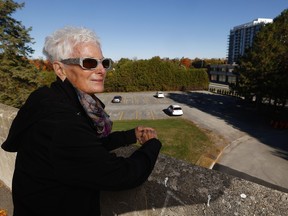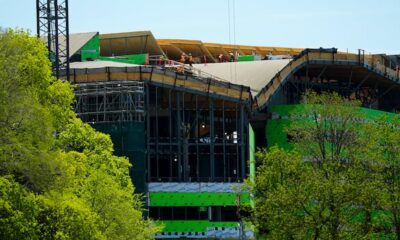Business
Residents Challenge Proposed Highrise Development on Baseline Road

Residents in Ottawa are raising significant concerns about a proposed highrise development on Baseline Road, arguing that the project does not align with the character of their neighborhood. The development plan, submitted by the Gatineau-based company Brigil, includes a nine-storey building, a 28-storey tower, and a 30-storey tower, featuring a total of 871 residential units and 585 parking spaces. The proposal is currently in the public consultation phase, with feedback being accepted until October 21, 2023.
The site, located west of Greenbank Road and just east of Queensway Carleton Hospital, has already seen the construction of a 13-storey and a 16-storey building, which provide an estimated 339 units. Following initial pushback, Brigil revised its original rezoning proposal to reduce the height of each tower by two storeys and cut the total number of residential units. Despite these changes, local residents remain dissatisfied, with many voicing their objections during the ongoing consultation period.
Andrew Bailes, a resident of the area for 11 years, is particularly vocal about the impact the development may have on transportation. He expressed concerns that the project is unsuitable for individuals without vehicles, noting the lack of nearby public transit options. “These are apartments so far away from downtown and so far away from decent transport links without any ability to have parking spaces,” Bailes stated. He has distributed leaflets to more than 100 community members, with only one person expressing support for the project.
Residents like Ruth Wiber and her husband André Laviolette, who live across the street from the proposed development, worry about losing their views of Brittania Bay and the subsequent increase in density and traffic. Laviolette highlighted that the new towers could obstruct nearly 40 percent of their sightline, stating, “Now 30 storeys means we won’t see any sky here at all.” They also raised concerns about the potential for overflow parking in their neighborhood, which could complicate navigation and increase safety risks.
Wiber emphasized her anxiety over the potential removal of green spaces in the area. She recalled a large patch of grass that had previously been transformed into a temporary parking lot during construction. “It’s just like the Joni Mitchell song: ‘They paved paradise, put up a parking lot,’” she remarked.
In response to the community’s concerns, Brigil has stated that they have engaged in multiple discussions with city officials to address residents’ needs. A spokesperson for the company emphasized that the site will include various amenities, such as a daycare and open green spaces, as part of a vision to transform an existing parking lot into a more welcoming environment. They also indicated that the limited on-site parking aims to promote pedestrian-friendly design and mitigate urban heat.
City Councillor Laine Johnson, who represents the area, acknowledged that the proposal is not without its flaws. She is committed to listening to community feedback before the project moves forward. Johnson emphasized the pressing need for housing options in the College Ward, particularly given the current affordability crisis. “We do need to build housing as a solution in order to bring back some level of affordability,” she stated.
While Baseline Road is set to become a rapid transit corridor, upgrades are not planned for the stretch in front of the proposed development for several more years. Johnson noted that improvements for pedestrian and cycling access are also underway. Nevertheless, she recognized that many residents feel the location is too far from adequate transit services to justify the reduced parking provisions.
The proposed development is part of a larger trend in Ontario, where legislation such as Bill 17 aims to expedite housing construction. Johnson highlighted the challenges this presents for municipalities, stating that local governments have fewer tools to advocate for community interests. “There are certain aspects to a growing city that are beyond the municipality’s control,” she asserted.
As the consultation period progresses, residents are keen to ensure their voices are heard, hoping to influence the final outcome of this significant development. The community’s concerns reflect broader issues of urban planning, transportation, and housing affordability that are increasingly relevant in cities across Canada.
-

 Politics4 weeks ago
Politics4 weeks agoSecwepemc First Nation Seeks Aboriginal Title Over Kamloops Area
-

 World5 months ago
World5 months agoScientists Unearth Ancient Antarctic Ice to Unlock Climate Secrets
-

 Entertainment5 months ago
Entertainment5 months agoTrump and McCormick to Announce $70 Billion Energy Investments
-

 Science5 months ago
Science5 months agoFour Astronauts Return to Earth After International Space Station Mission
-

 Lifestyle5 months ago
Lifestyle5 months agoTransLink Launches Food Truck Program to Boost Revenue in Vancouver
-

 Technology3 months ago
Technology3 months agoApple Notes Enhances Functionality with Markdown Support in macOS 26
-

 Lifestyle3 months ago
Lifestyle3 months agoManitoba’s Burger Champion Shines Again Amid Dining Innovations
-

 Top Stories2 months ago
Top Stories2 months agoUrgent Update: Fatal Crash on Highway 99 Claims Life of Pitt Meadows Man
-

 Politics4 months ago
Politics4 months agoUkrainian Tennis Star Elina Svitolina Faces Death Threats Online
-

 Sports5 months ago
Sports5 months agoSearch Underway for Missing Hunter Amid Hokkaido Bear Emergency
-

 Politics5 months ago
Politics5 months agoCarney Engages First Nations Leaders at Development Law Summit
-

 Technology5 months ago
Technology5 months agoFrosthaven Launches Early Access on July 31, 2025




















